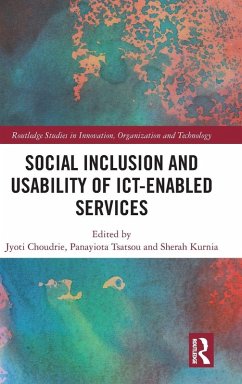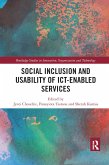Social Inclusion and Usability of ICT-enabled Services.
Herausgeber: Choudrie, Jyoti; Tsatsou, Panayiota; Kurnia, Sherah
Social Inclusion and Usability of ICT-enabled Services.
Herausgeber: Choudrie, Jyoti; Tsatsou, Panayiota; Kurnia, Sherah
- Gebundenes Buch
- Merkliste
- Auf die Merkliste
- Bewerten Bewerten
- Teilen
- Produkt teilen
- Produkterinnerung
- Produkterinnerung
Social Inclusion and Usability of Innovative ICT-enabled Services is a cutting-edge research book written for researchers, students, academics, technology experts, activists and policy makers. The book explores a wide range of issues concerning innovative ICT-enabled digital services, their usability and their consequent role in social inclusion
Andere Kunden interessierten sich auch für
![Social Inclusion and Usability of ICT-enabled Services. Social Inclusion and Usability of ICT-enabled Services.]() Social Inclusion and Usability of ICT-enabled Services.56,99 €
Social Inclusion and Usability of ICT-enabled Services.56,99 €![The Diffusion of Information and Communication Technologies The Diffusion of Information and Communication Technologies]() Ewa LechmanThe Diffusion of Information and Communication Technologies196,99 €
Ewa LechmanThe Diffusion of Information and Communication Technologies196,99 €![Didactic training with ICT inclusion Didactic training with ICT inclusion]() Bertha Alicia Arvizu LópezDidactic training with ICT inclusion47,99 €
Bertha Alicia Arvizu LópezDidactic training with ICT inclusion47,99 €![ICT and Rural Development in the Global South ICT and Rural Development in the Global South]() Willem van EekelenICT and Rural Development in the Global South171,99 €
Willem van EekelenICT and Rural Development in the Global South171,99 €![Developing Windows-Based and Web-Enabled Information Systems Developing Windows-Based and Web-Enabled Information Systems]() Nong YeDeveloping Windows-Based and Web-Enabled Information Systems188,99 €
Nong YeDeveloping Windows-Based and Web-Enabled Information Systems188,99 €![User-Centric Evaluation of Government of Kenya Online Services User-Centric Evaluation of Government of Kenya Online Services]() Judith OwigarUser-Centric Evaluation of Government of Kenya Online Services27,99 €
Judith OwigarUser-Centric Evaluation of Government of Kenya Online Services27,99 €![The A.I. Enabled Nonprofit The A.I. Enabled Nonprofit]() Robert GreenThe A.I. Enabled Nonprofit24,99 €
Robert GreenThe A.I. Enabled Nonprofit24,99 €-
-
-
Social Inclusion and Usability of Innovative ICT-enabled Services is a cutting-edge research book written for researchers, students, academics, technology experts, activists and policy makers. The book explores a wide range of issues concerning innovative ICT-enabled digital services, their usability and their consequent role in social inclusion
Produktdetails
- Produktdetails
- Verlag: Routledge
- Seitenzahl: 400
- Erscheinungstermin: 3. November 2017
- Englisch
- Abmessung: 235mm x 157mm x 26mm
- Gewicht: 728g
- ISBN-13: 9781138935556
- ISBN-10: 1138935557
- Artikelnr.: 43680130
- Herstellerkennzeichnung
- Libri GmbH
- Europaallee 1
- 36244 Bad Hersfeld
- gpsr@libri.de
- Verlag: Routledge
- Seitenzahl: 400
- Erscheinungstermin: 3. November 2017
- Englisch
- Abmessung: 235mm x 157mm x 26mm
- Gewicht: 728g
- ISBN-13: 9781138935556
- ISBN-10: 1138935557
- Artikelnr.: 43680130
- Herstellerkennzeichnung
- Libri GmbH
- Europaallee 1
- 36244 Bad Hersfeld
- gpsr@libri.de
Jyoti Choudrie holds the position of Professor of Information Systems at University of Hertfordshire, UK. Panayiota Tsatsou is an Associate Professor at the University of Leicester, UK. Sherah Kurnia is a Senior Lecturer at the School of Computing and Information Systems, the University of Melbourne, Australia.
Part 1: Examining the Theoretical Foundations of Social Inclusion and
ICT-Enabled Services
1. Social Inclusion and ICTs: a Literature Review Through the Lens of the
Capability Approach
Efpraxia D. Zamani
2. Connectivity: A Socio-technical Construct to Examine ICT-enabled Service
Christoph F. Breidbach
3. Re-conceptualizing Social Inclusion in the Context of 21st Century Smart
Cities
H. Patricia McKenna
4. Enhancing Social Inclusion Through Optimal Community Participation
Levels in ICT4D Projects
Arthur Glenn Maail, Sherah Kurnia , and Shanton Chang
Part 2: ICT-Enabled Services of Value to Society and Organisations
5. Understanding the Impact of Political Structure, Governance and Public
Policy on e-Government
David J. Yates, Girish J. "Jeff" Gulati, and Christine B. Williams
6. ICT-enabled E-entertainment Services in United States Counties:
Socio-Economic Determinants and Geographic Patterns
Avijit Sarkar, James Pick, and Jessica Rosales
7. E-health as an Enabler of Social Inclusion
Ken Clarke, Adam Lodders, Robyn Garnett, Anne Holland, Rodrigo Mariño, and
Zaher Joukhadar
8. Challenging the Cost of Higher Education with the Assistance of Digital
Tools: Case Studies of Protest Activity in Canada and the United States
Victoria Carty
9. Telework Impact on Productivity and Wellbeing: An Australian Study
Rachelle Bosua, Sherah Kurnia, Marianne Gloet, and Antonette Mendoza
10. Supporting Regional Food Supply Chains with an E-Commerce Application
Sherah Kurnia, Md Mahbubur Rahim, Serenity Hill, Kirsten Larsen, Patrice
Braun, Danny Samson, and Prakash Singh
Part 3: Adoption, Usage and Management Aspects Surrounding Social Inclusion
and Usability of ICT-Enabled Services
11. Digital Divides, Usability and Social Inclusion: Evidence from the
Field of E-Services in the UK
Bianca C. Reisdorf and Darja Groselj
12. Mobility of Work: Usability of Digital Infrastructures and
Technological Divide
Mohammad Hossein Jarrahi and Luke Williamson
13. Overcoming Obstacles to Activism with ICTs: An Analysis of MoveOn.Org
and the Florida Tea Party Movement
Deana A. Rohlinger and Shawn Gaulden
14. Social Inclusion, Farmer Resignation and the Challenges of Information
Technology Implementation
Ranjan Vaidya
15. Smartphones Adoption and Usage of 50+ Adults in the United Kingdom
Jyoti Choudrie, Sutee Pheeraphuttharangkoon, and Uchenna Ojiako
16. Literacy and Identity Links Forging Digital Inclusion? Critical
Reflections and Signposts from a Qualitative Study
Panayiota Tsatsou, Gillian Youngs, and Carolyn Watt
Conclusion
Panayiota Tsatsou, Sherah Kurnia, and Jyoti Choudrie
ICT-Enabled Services
1. Social Inclusion and ICTs: a Literature Review Through the Lens of the
Capability Approach
Efpraxia D. Zamani
2. Connectivity: A Socio-technical Construct to Examine ICT-enabled Service
Christoph F. Breidbach
3. Re-conceptualizing Social Inclusion in the Context of 21st Century Smart
Cities
H. Patricia McKenna
4. Enhancing Social Inclusion Through Optimal Community Participation
Levels in ICT4D Projects
Arthur Glenn Maail, Sherah Kurnia , and Shanton Chang
Part 2: ICT-Enabled Services of Value to Society and Organisations
5. Understanding the Impact of Political Structure, Governance and Public
Policy on e-Government
David J. Yates, Girish J. "Jeff" Gulati, and Christine B. Williams
6. ICT-enabled E-entertainment Services in United States Counties:
Socio-Economic Determinants and Geographic Patterns
Avijit Sarkar, James Pick, and Jessica Rosales
7. E-health as an Enabler of Social Inclusion
Ken Clarke, Adam Lodders, Robyn Garnett, Anne Holland, Rodrigo Mariño, and
Zaher Joukhadar
8. Challenging the Cost of Higher Education with the Assistance of Digital
Tools: Case Studies of Protest Activity in Canada and the United States
Victoria Carty
9. Telework Impact on Productivity and Wellbeing: An Australian Study
Rachelle Bosua, Sherah Kurnia, Marianne Gloet, and Antonette Mendoza
10. Supporting Regional Food Supply Chains with an E-Commerce Application
Sherah Kurnia, Md Mahbubur Rahim, Serenity Hill, Kirsten Larsen, Patrice
Braun, Danny Samson, and Prakash Singh
Part 3: Adoption, Usage and Management Aspects Surrounding Social Inclusion
and Usability of ICT-Enabled Services
11. Digital Divides, Usability and Social Inclusion: Evidence from the
Field of E-Services in the UK
Bianca C. Reisdorf and Darja Groselj
12. Mobility of Work: Usability of Digital Infrastructures and
Technological Divide
Mohammad Hossein Jarrahi and Luke Williamson
13. Overcoming Obstacles to Activism with ICTs: An Analysis of MoveOn.Org
and the Florida Tea Party Movement
Deana A. Rohlinger and Shawn Gaulden
14. Social Inclusion, Farmer Resignation and the Challenges of Information
Technology Implementation
Ranjan Vaidya
15. Smartphones Adoption and Usage of 50+ Adults in the United Kingdom
Jyoti Choudrie, Sutee Pheeraphuttharangkoon, and Uchenna Ojiako
16. Literacy and Identity Links Forging Digital Inclusion? Critical
Reflections and Signposts from a Qualitative Study
Panayiota Tsatsou, Gillian Youngs, and Carolyn Watt
Conclusion
Panayiota Tsatsou, Sherah Kurnia, and Jyoti Choudrie
Part 1: Examining the Theoretical Foundations of Social Inclusion and
ICT-Enabled Services
1. Social Inclusion and ICTs: a Literature Review Through the Lens of the
Capability Approach
Efpraxia D. Zamani
2. Connectivity: A Socio-technical Construct to Examine ICT-enabled Service
Christoph F. Breidbach
3. Re-conceptualizing Social Inclusion in the Context of 21st Century Smart
Cities
H. Patricia McKenna
4. Enhancing Social Inclusion Through Optimal Community Participation
Levels in ICT4D Projects
Arthur Glenn Maail, Sherah Kurnia , and Shanton Chang
Part 2: ICT-Enabled Services of Value to Society and Organisations
5. Understanding the Impact of Political Structure, Governance and Public
Policy on e-Government
David J. Yates, Girish J. "Jeff" Gulati, and Christine B. Williams
6. ICT-enabled E-entertainment Services in United States Counties:
Socio-Economic Determinants and Geographic Patterns
Avijit Sarkar, James Pick, and Jessica Rosales
7. E-health as an Enabler of Social Inclusion
Ken Clarke, Adam Lodders, Robyn Garnett, Anne Holland, Rodrigo Mariño, and
Zaher Joukhadar
8. Challenging the Cost of Higher Education with the Assistance of Digital
Tools: Case Studies of Protest Activity in Canada and the United States
Victoria Carty
9. Telework Impact on Productivity and Wellbeing: An Australian Study
Rachelle Bosua, Sherah Kurnia, Marianne Gloet, and Antonette Mendoza
10. Supporting Regional Food Supply Chains with an E-Commerce Application
Sherah Kurnia, Md Mahbubur Rahim, Serenity Hill, Kirsten Larsen, Patrice
Braun, Danny Samson, and Prakash Singh
Part 3: Adoption, Usage and Management Aspects Surrounding Social Inclusion
and Usability of ICT-Enabled Services
11. Digital Divides, Usability and Social Inclusion: Evidence from the
Field of E-Services in the UK
Bianca C. Reisdorf and Darja Groselj
12. Mobility of Work: Usability of Digital Infrastructures and
Technological Divide
Mohammad Hossein Jarrahi and Luke Williamson
13. Overcoming Obstacles to Activism with ICTs: An Analysis of MoveOn.Org
and the Florida Tea Party Movement
Deana A. Rohlinger and Shawn Gaulden
14. Social Inclusion, Farmer Resignation and the Challenges of Information
Technology Implementation
Ranjan Vaidya
15. Smartphones Adoption and Usage of 50+ Adults in the United Kingdom
Jyoti Choudrie, Sutee Pheeraphuttharangkoon, and Uchenna Ojiako
16. Literacy and Identity Links Forging Digital Inclusion? Critical
Reflections and Signposts from a Qualitative Study
Panayiota Tsatsou, Gillian Youngs, and Carolyn Watt
Conclusion
Panayiota Tsatsou, Sherah Kurnia, and Jyoti Choudrie
ICT-Enabled Services
1. Social Inclusion and ICTs: a Literature Review Through the Lens of the
Capability Approach
Efpraxia D. Zamani
2. Connectivity: A Socio-technical Construct to Examine ICT-enabled Service
Christoph F. Breidbach
3. Re-conceptualizing Social Inclusion in the Context of 21st Century Smart
Cities
H. Patricia McKenna
4. Enhancing Social Inclusion Through Optimal Community Participation
Levels in ICT4D Projects
Arthur Glenn Maail, Sherah Kurnia , and Shanton Chang
Part 2: ICT-Enabled Services of Value to Society and Organisations
5. Understanding the Impact of Political Structure, Governance and Public
Policy on e-Government
David J. Yates, Girish J. "Jeff" Gulati, and Christine B. Williams
6. ICT-enabled E-entertainment Services in United States Counties:
Socio-Economic Determinants and Geographic Patterns
Avijit Sarkar, James Pick, and Jessica Rosales
7. E-health as an Enabler of Social Inclusion
Ken Clarke, Adam Lodders, Robyn Garnett, Anne Holland, Rodrigo Mariño, and
Zaher Joukhadar
8. Challenging the Cost of Higher Education with the Assistance of Digital
Tools: Case Studies of Protest Activity in Canada and the United States
Victoria Carty
9. Telework Impact on Productivity and Wellbeing: An Australian Study
Rachelle Bosua, Sherah Kurnia, Marianne Gloet, and Antonette Mendoza
10. Supporting Regional Food Supply Chains with an E-Commerce Application
Sherah Kurnia, Md Mahbubur Rahim, Serenity Hill, Kirsten Larsen, Patrice
Braun, Danny Samson, and Prakash Singh
Part 3: Adoption, Usage and Management Aspects Surrounding Social Inclusion
and Usability of ICT-Enabled Services
11. Digital Divides, Usability and Social Inclusion: Evidence from the
Field of E-Services in the UK
Bianca C. Reisdorf and Darja Groselj
12. Mobility of Work: Usability of Digital Infrastructures and
Technological Divide
Mohammad Hossein Jarrahi and Luke Williamson
13. Overcoming Obstacles to Activism with ICTs: An Analysis of MoveOn.Org
and the Florida Tea Party Movement
Deana A. Rohlinger and Shawn Gaulden
14. Social Inclusion, Farmer Resignation and the Challenges of Information
Technology Implementation
Ranjan Vaidya
15. Smartphones Adoption and Usage of 50+ Adults in the United Kingdom
Jyoti Choudrie, Sutee Pheeraphuttharangkoon, and Uchenna Ojiako
16. Literacy and Identity Links Forging Digital Inclusion? Critical
Reflections and Signposts from a Qualitative Study
Panayiota Tsatsou, Gillian Youngs, and Carolyn Watt
Conclusion
Panayiota Tsatsou, Sherah Kurnia, and Jyoti Choudrie








